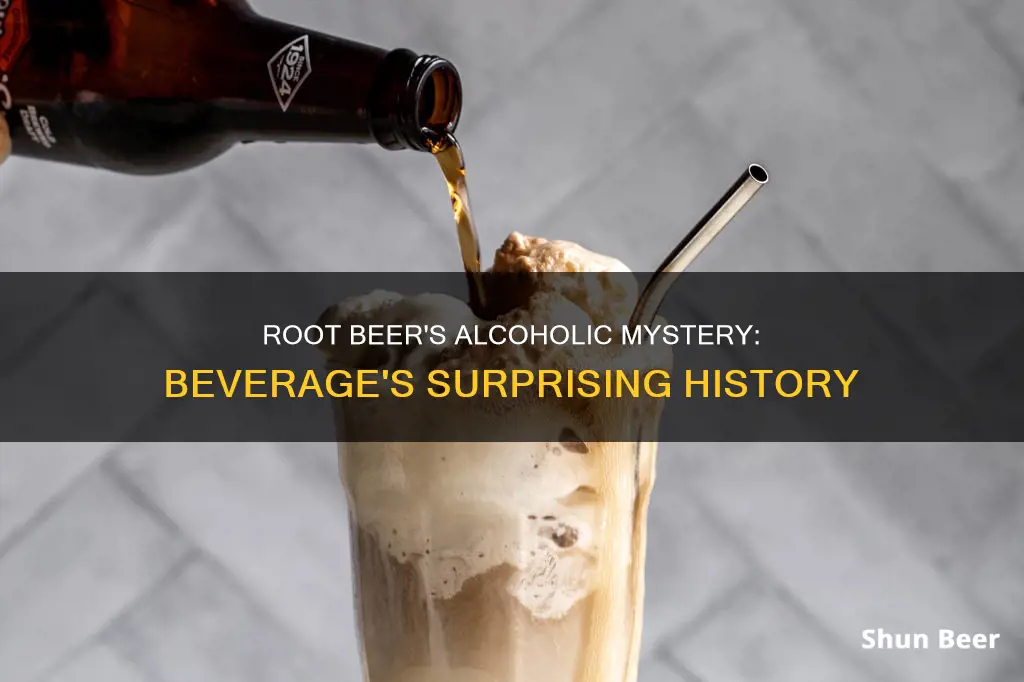
Root beer is a sweet, carbonated soft drink that originated in North America. It is typically non-alcoholic and caffeine-free, but there are exceptions. The drink is usually made using the root bark of the sassafras tree or the vine of the sarsaparilla plant, giving it its distinctive flavour. While most commercial root beers are non-alcoholic, traditional methods of making the drink can result in a small amount of alcohol being produced, and some modern brands also sell alcoholic versions.
What You'll Learn

Root beer is typically non-alcoholic
Root beer was originally made with water, sugar, and the roots of the sassafras tree, which provided its flavour. However, safrole, a key component of sassafras, was banned by the U.S. Food and Drug Administration in 1960 due to its carcinogenic properties. As a result, most commercial root beers today are artificially flavoured, although some use a safrole-free sassafras extract.
The traditional process of making root beer involved adding yeast to the mixture of water, sugar, and sassafras, which would carbonate the drink and produce a small amount of alcohol, usually around 2% ABV or less. However, root beer was typically consumed before the fermentation process was complete, resulting in a non-alcoholic drink.
While most modern root beers are non-alcoholic, there are some exceptions. For example, "hard root beers" have gained popularity in recent years, such as Not Your Father's Root Beer, which contains 5.9% ABV. These alcoholic versions are typically marketed towards people who don't usually like the taste of beer. It's important to read labels carefully to ensure you're getting a non-alcoholic version if that's what you're looking for.
Beer and Fun: Chuck E. Cheese, Atlanta Style!
You may want to see also

But traditional root beer contains 2% alcohol
Root beer is a sweet North American soft drink traditionally made using the root bark of the sassafras tree or the vine of Smilax ornata (sarsaparilla). It is typically non-alcoholic, caffeine-free, and carbonated. However, it is important to note that traditional root beer, made using the classic process, can contain a small amount of alcohol.
Indeed, root beer made with the traditional process can contain about 2% alcohol. This low alcohol content is a result of the fermentation process used in its production. The traditional recipe for root beer involves cooking a syrup from molasses and water, then combining it with root ingredients, including sassafras root, sassafras bark, and wintergreen. Yeast is then added, and the beverage is left to ferment for 12 hours. This fermentation process results in a small amount of alcohol being produced, typically around 2% but sometimes more or less, depending on the specific recipe and fermentation time.
The presence of alcohol in traditional root beer is an important distinction from the modern, commercially produced root beer commonly found in shops and markets. Today, most root beer is artificially flavoured and carbonated, without any fermentation involved. This modern production process ensures that the root beer sold in stores is non-alcoholic and suitable for all ages.
However, it is worth noting that there has been a recent rise in the popularity of alcoholic root beers, often referred to as "hard root beers". These beverages are intentionally crafted to contain alcohol, targeting consumers who seek a unique drinking experience that combines the flavour of root beer with a higher alcohol content. These "hard root beers" are typically stronger than traditional root beers, with alcohol percentages ranging from 5.9% to 6.6%.
In conclusion, while most modern root beer is non-alcoholic, the traditional production methods of root beer can result in a beverage containing approximately 2% alcohol. This distinction is essential for consumers, especially those who wish to avoid alcoholic drinks or those offering root beer to underage individuals. Therefore, it is always important to read labels carefully and inquire about the type of root beer being offered or purchased to ensure it aligns with one's preferences and expectations.
Celiac and Beer: What's Safe to Drink?
You may want to see also

Alcoholic root beer has grown in popularity
The history of root beer dates back to the eighteenth century in North America, where it was traditionally made using the root bark of the sassafras tree or the vine of Smilax ornata (sarsaparilla). Root beer was originally consumed for its medicinal qualities, and non-alcoholic versions became especially popular during Prohibition.
In the 2000s, several alcoholic root beers were introduced, including Small Town Brewery's Not Your Father's Root Beer, Coney Island Brewing Co.'s hard root beer, and Best Damn Brewing Co.'s Best Damn Root Beer. These brands capitalised on the growing consumer interest in hard sodas and offered a unique twist on the traditional root beer flavour.
One notable example of a company that expanded into the hard root beer market is Sprecher Brewery. Sprecher initially focused on craft beers but later introduced a hard root beer in response to customer demand. Their hard root beer combines the flavours of their traditional root beer with bourbon and oak notes.
The rise in popularity of alcoholic root beer can also be attributed to the resurgence of flavoured malt beverages (FMBs). According to Wine Enthusiast, while the popularity of hard sodas may not have reached its mid-2010s peak, it is still a growing category. This trend has likely contributed to the success of alcoholic root beer variants.
In conclusion, alcoholic root beer has gained traction in recent years due to consumer demand for variety and the resurgence of FMBs. Several brands have successfully entered this market, offering unique flavour profiles that build upon the traditional root beer taste. As consumer preferences continue to evolve, it is likely that we will see further innovation and growth in the alcoholic root beer space.
Mixing Beer and Xanax: What's the Danger?
You may want to see also

Root beer is artificially flavoured and carbonated
Root beer is a sweet North American soft drink. It is typically non-alcoholic, caffeine-free, and carbonated. It is usually thick and foamy when poured.
Root beer was traditionally made using the root bark of the sassafras tree or the vine of the sarsaparilla plant as its primary flavour. However, since safrole, a key component of sassafras, was banned by the U.S. Food and Drug Administration in 1960 due to its carcinogenic properties, most commercial root beers have been artificially flavoured.
Some traditional recipes for root beer involve cooking a syrup from molasses and water, letting the syrup cool, and then combining it with root ingredients (including sassafras root, sassafras bark, and wintergreen). Yeast was added, and the beverage was left to ferment for 12 hours, resulting in a beverage of 2% alcohol or less. This recipe could be modified to produce a more alcoholic beverage.
Today, most major brands of root beer are artificially flavoured and carbonated. However, there are exceptions, such as when alcohol is intentionally added to create hard sodas or energy drinks. For example, in 2013, Sprecher released a hard root beer described as having "all the flavors and characteristics of Sprecher Root Beer nicely melded with bourbon and oak flavors."
Monkeys and Beer: A Safe Combination?
You may want to see also

It's a soft drink with a large fan following
Root beer is a sweet North American soft drink with a large fan following. It is typically non-alcoholic, caffeine-free, and carbonated. The drink is usually thick and foamy, with a distinctive flavour derived from the root bark of the sassafras tree or the vine of Smilax ornata (sarsaparilla).
Root beer's origins can be traced back to the eighteenth century in the United States, where it was often consumed hot and used for medicinal purposes. The drink was initially marketed as ""root tea"" by pharmacist Charles Elmer Hires in 1875, who wanted to emphasise its non-alcoholic nature. However, to appeal to Pennsylvania coal miners, he rebranded it as "root beer". Hires debuted his commercial version of root beer at the Philadelphia Centennial Exposition in 1876, and it quickly gained popularity.
The traditional process of making root beer involves cooking a syrup from molasses and water, combining it with root ingredients, and allowing it to ferment with yeast, resulting in a beverage with 2% alcohol or less. However, most modern root beers are artificially flavoured and carbonated, without fermentation, to create a non-alcoholic drink. This shift occurred after safrole, a key component of sassafras, was banned in 1960 due to its carcinogenic properties.
While root beer is typically non-alcoholic, there are exceptions. Some brands, such as Small Town Brewery's "Not Your Father's Root Beer" and Sprecher's "Hard Root Beer", have introduced alcoholic versions of the drink. These alcoholic root beers have gained popularity and expanded distribution, attracting attention from beer enthusiasts and those seeking a unique beverage.
Overall, root beer has a large fan following due to its unique flavour, crisp taste, and versatility as a non-alcoholic option. It has become a beloved soft drink, enjoyed by people of all ages across North America and beyond.
Beer and Baseball: Should They Mix?
You may want to see also
Frequently asked questions
Root beer is typically a non-alcoholic drink. However, there are alcoholic versions of root beer available.
Root beer is made with water, sugar, and the root bark of the sassafras tree or the vine of Smilax ornata (sarsaparilla) for flavour. Carbonation is added through fermentation or by injecting carbon dioxide under pressure.
No, root beer is a type of soda. It gets its name from its roots in European "small beer", a low-alcohol drink.
Root beer is high in sugar and contains caffeine and artificial flavourings. It is best consumed occasionally and in moderation.
Popular brands of root beer include Sprecher, A&W, Barq's, Dad's, Hires, and Mug.







